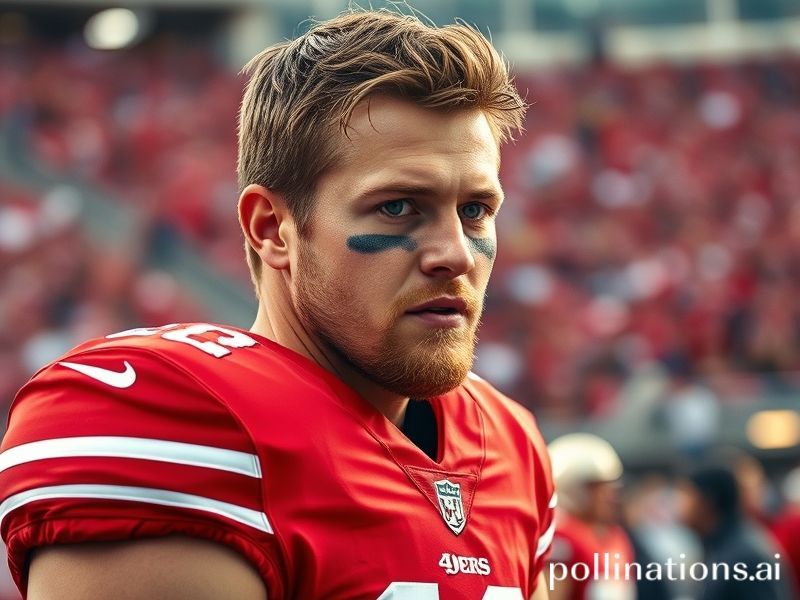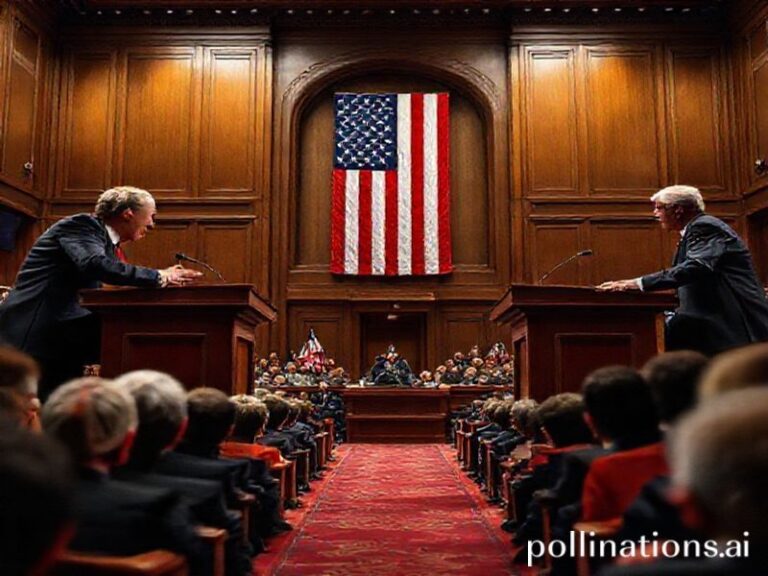The Last Fullback: How Kyle Juszczyk Explains the Global Gig Economy, Geopolitics, and the Absurd Price of Doing Everything at Once
Kyle Juszczyk: The Fullback as Global Metaphor, or How One Man in a One-Man Position Explains the Twenty-First Century
By the time the fourth quarter rolls around in a mid-November NFL game—let’s say the Niners are up by five in Munich because nothing screams “cultural sensitivity” like shipping shoulder pads to Bavaria—Kyle Juszczyk has already blocked a blitzing linebacker, motioned into the slot, drawn a pass-interference flag, and signed a couple of helmets for German teenagers who will spend the rest of their lives pronouncing his surname like a sneeze. The league markets this as “Football Goes Global.” The rest of us recognize it for what it is: exporting the American art of doing everything at once while being paid like a specialist.
Juszczyk is, technically, a fullback—a position so anachronistic it might as well arrive on the field in a horse-drawn cart. In a world that has learned to monetize every last calorie of human attention, the man makes his living as a Swiss-army-knife afterthought. He blocks, he catches, he occasionally carries the ball like a drunk tourist carrying a stein: carefully, joyfully, aware the contents are both precious and likely to spill. If that sounds like the job description for every gig-economy courier currently threading through Jakarta traffic, congratulations—you’ve grasped the international resonance.
Across continents, the polite fiction we tell ourselves is that specialization equals progress. We hail the coder in Tallinn, the lithium miner in the Atacama, the influencer in Dubai. Yet the global labor market increasingly rewards those who can plug a different hole every snap. Juszczyk is the living rebuttal to Adam Smith’s pin factory: rather than spending his life adding a single head to a single point, he’s the guy who can forge the pin, market the pin, and then pancake a defensive end when the pin inevitably gets recalled for safety violations.
Consider the geopolitics. China’s Belt and Road Initiative finances ports in Kenya, highways in Serbia, and coal plants wherever shame is still negotiable. Each project is a down block clearing the way for some other, shinier ball carrier—usually a container ship full of microchips. Juszczyk would nod in recognition; he’s been the pulling guard for Deebo Samuel’s entire career. Meanwhile, Europe frets about energy diversification the way Kyle’s quarterback frets about pre-snap rotations: lots of hand-waving, very little certainty the hot read won’t drop the pass.
The fullback’s recent contract—five years, $27 million, or roughly what the Bundesliga spends on half-time orange slices—was greeted Stateside as proof that grit still pays. Internationally, it reads differently. In Nigeria, $5.4 million per annum is the sort of figure whispered about cabinet ministers who have never lifted anything heavier than a Montblanc pen. In India, it’s the cost of two new metro stops in Mumbai, assuming no one skims. In the UK, it’s a week of Liz Truss economic policy. The numbers are big, the moral is small: value is whatever a panicking general manager says it is at 3 a.m. on franchise-tag deadline day.
And then there’s the jersey itself. Kids in Mexico City wear No. 44 because they watched highlights on TikTok; they have no idea what a “pro-style offense” is, but they know the silhouette of a man who will literally shove the world out of his teammate’s way. It’s a twenty-first-century inversion of colonial export: instead of sending missionaries, we ship motion concepts. Instead of smallpox blankets, we drop 4K end-zone replays. The locals adapt, remix, and pretty soon you’re watching a high-school playoff in Monterrey where the fullback just read-optioned his way into a Division I scholarship. Call it cultural hegemony, call it progress—either way, Kyle gets a royalty check.
The joke, of course, is that Juszczyk may be the last of his species. Analytics departments treat fullbacks the way central banks treat gold: quaint, bulky, useful only in a crisis. Yet every time the global supply chain coughs—Suez Canal blocked, microchips delayed, grain stuck in Odesa—someone somewhere has to line up and do the unglamorous work of clearing space. If that sounds like a metaphor for the entire planet circa 2024, well, grab your mouthpiece. History is just play-action, and we’re all running routes into the flat, hoping the ball doesn’t arrive with a customs tariff attached.
Conclusion: In the grand, slightly ridiculous theatre of international affairs, Kyle Juszczyk is less a football player than a blunt reminder. Economies pivot, empires recalibrate, but somebody still has to throw the block that keeps the whole damn play alive. He earns millions to be invisible until the moment he isn’t—a working definition of modern indispensability. The rest of us? We do it for free and hope the highlight makes it to Twitter before the platform collapses. Somewhere in Silicon Valley, a venture capitalist is already drafting a white paper: “Fullback-as-a-Service.” Don’t laugh; it’ll IPO at $40 billion and still won’t pick up the blitz.







